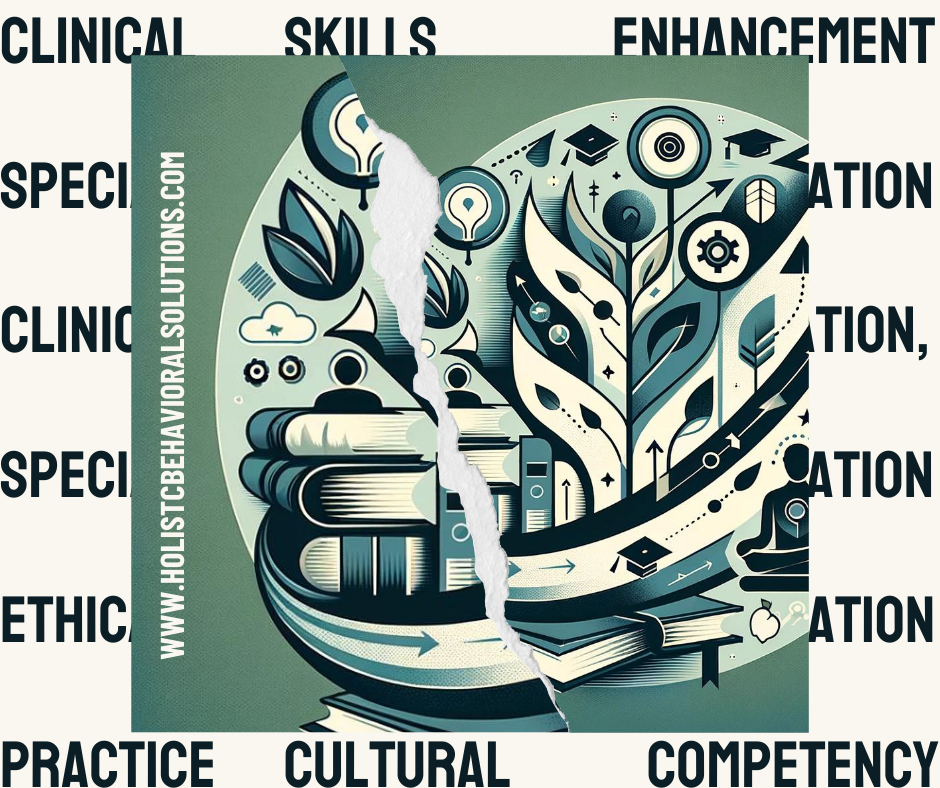
Welcome to our page dedicated to professional development within the counseling practice. In the dynamic field of mental health, the continuous growth and development of counseling professionals are paramount. This page is designed for counselors at all stages of their careers, offering insights, resources, and strategies to foster professional growth and enhance the quality of care provided to clients. This page is updated with additional resources intermittently.
Understanding Professional Development in Counseling
Professional development encompasses a broad range of activities and processes aimed at enhancing counselors’ skills, knowledge, and expertise. It’s a lifelong journey that begins with formal education and extends throughout one’s career, adapting to the evolving landscape of mental health care and the diverse needs of clients.
The Importance of Ongoing Learning
In the fast-paced world of mental health, new research, methodologies, and best practices emerge regularly. Engaging in ongoing learning ensures that counselors remain at the forefront of the field, equipped with the latest tools and insights to support their clients effectively.
Key Areas for Professional Development
- Clinical Skills Enhancement: Explore advanced therapeutic techniques, new counseling modalities, and refine your client engagement and intervention approach.
- Specialization and Certification: Consider specializing in areas such as trauma-informed care, addiction counseling, or family therapy. Obtaining certifications in these specializations can broaden your expertise and service offerings.
- Ethical Practice and Cultural Competency: Stay updated on ethical guidelines and enhance your cultural competency to provide respectful, inclusive, and effective counseling across diverse populations.
- Self-Care and Burnout Prevention: Learn strategies for maintaining your well-being and preventing burnout, ensuring your longevity and effectiveness in the counseling profession.
Strategies for Professional Development
- Continuing Education: Participate in workshops, seminars, and courses that offer CE credits. Many professional associations and institutions provide opportunities for continuing education tailored to counselors’ needs.
- Professional Networking: Engage with peers through conferences, professional associations, and online communities. Networking can provide valuable support, collaboration opportunities, and insights into emerging trends in counseling.
- Supervision and Mentorship: Whether you’re a novice or experienced counselor, supervision and mentorship can provide personalized guidance, feedback, and support in your professional journey.
- Research and Publication: Contribute to the field by conducting research, presenting at conferences, or publishing articles. This not only enhances your knowledge but also positions you as a thought leader in the counseling community.
- Technological Proficiency: Stay abreast of technological advancements in teletherapy, digital tools for mental health, and online resources that can enhance your practice and client engagement.
Benefits of Professional Development
- Improved Client Outcomes: By continuously honing your skills and knowledge, you can provide more effective and innovative care, leading to better outcomes for your clients.
- Career Advancement: Professional development can open doors to new opportunities, leadership roles, and areas of specialization, enriching your career path.
- Personal Fulfillment: Engaging in lifelong learning and contributing to your field can offer a deep sense of fulfillment and purpose, fueling your passion for counseling.
- Adaptability: In a field as dynamic as counseling, the ability to adapt to new challenges, populations, and societal changes is crucial. Professional development fosters this adaptability, ensuring you remain relevant and effective.
Resources for Professional Development
- Professional Associations: Organizations such as the American Counseling Association (ACA) and the National Board for Certified Counselors (NBCC) offer resources, continuing education, and networking opportunities.
- Online Platforms and Journals: Websites like Psychotherapy Networker, Counseling Today, and the Journal of Counseling & Development, and Additude Magazine provide a wealth of articles, case studies, and research findings.
- Workshops and Conferences: Annual conferences, such as the ACA Conference & Expo, offer workshops, keynote speeches, and networking opportunities that can significantly enhance your professional knowledge.
- Online Courses and Webinars: Platforms like Coursera, Udemy, and LinkedIn Learning offer courses on various counseling topics, allowing you to learn at your own pace.
Professional Development: A Commitment to Excellence
In the counseling profession, where the well-being of others rests in our hands, the commitment to ongoing professional development is not just beneficial—it’s essential. By dedicating ourselves to continuous growth, we not only enrich our own lives and careers but also ensure that we provide the highest standard of care to those who seek our support.
We invite you to explore the resources, strategies, and insights shared on this page to embark on or further your journey of professional development. Together, let’s foster a culture of excellence, innovation, and compassion within the counseling community.
For more information on professional development opportunities, resources, and guidance tailored to your specific needs, please send us an email at info@holisticbehavioralsolutions.com. Our team is dedicated to supporting your growth and success in the counseling profession.
The Holistic Store
While we are thinking that through, boost your connection from the inside out with our wellness supplements and supplies. Check out our store for products that help you feel your best, making it easier to open up and connect on a deeper level.